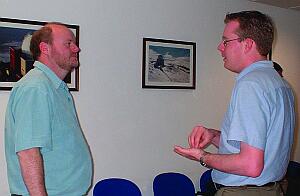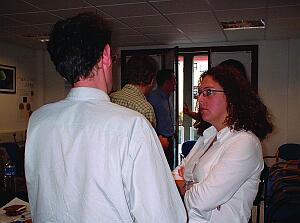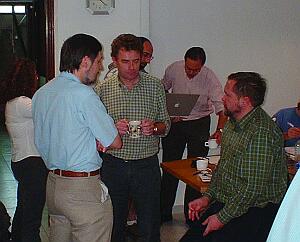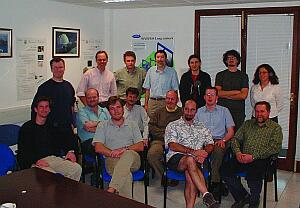NAOMI Workshop
Adaptive
Optics has been the centre piece of ING’s development programme for some
years now. First results of the NAOMI AO system at the WHT have been presented
in earlier issues of this newsletter. As ING is climbing the steep learning
curve of adaptive optics, the time was considered ripe to compare our experience
at the WHT with that of other telescopes with many more years of experience.
In order to keep the workshop well focussed and encourage the best opportunities
for debating results only a small number of participants were invited to
attend. Key invited guests included Norbert Hubin from the European Southern
Observatory, Francois Rigaut from GEMINI, Stefan Hippler from the Max Planck
Institute for Astronomy, and Eric Steinbring from the Centre for Adaptive
Optics. But apart from the invited guests, we also had excellent contributions
from Adriano Ghedina of the Telescopio Nazionale Galileo, where adaptive
optics features as part of the instrument set, and from Nicholas Devaney
of the GTC 10-m telescope project. Plans for GTC include an AO system as
part of their second-generation instrument suit. Presentations on design
and current performance of NAOMI and the OSCA coronograph were given by Richard
Myers from Durham University, and by Chris Benn and Sebastian Els from the
ING.
Presentations and discussions included aspects such as performance expectations
and reality of operational AO systems; performance characterisation; specific
problems and advantages of segmented and continuous deformable mirrors; calibration
and data reduction aspects. For the AO group at ING this sharing of experience
and open discussion has been an extremely useful event which helped the team
to focus on key questions with some of the world specialists in the field. More information:
http://www.ing.iac.es/~fprada/naomi.html.
¤

|

|

|

|
| Snapshots and participants of the NAOMI
Workshop 9-11 January 2003.
|
Email contact: René
Rutten (
rgmr@ing.iac.es)





